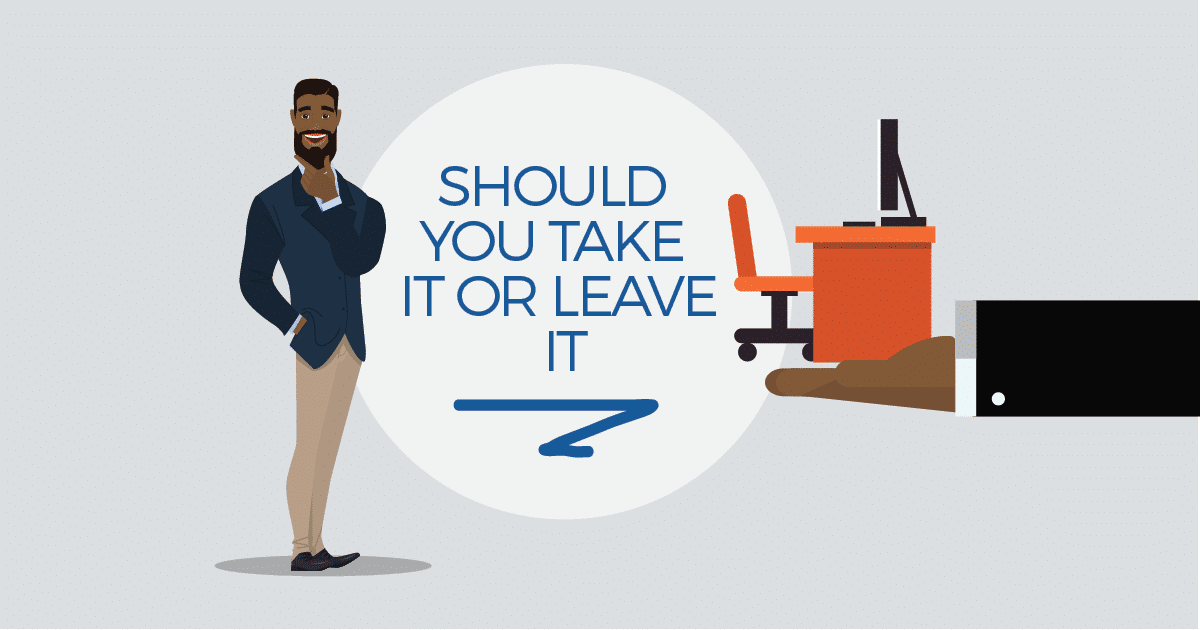When you’re considering a job offer, there’s more to think about than just how much you are going to be paid. For some people, salary is the only deciding factor, but there is more to having a satisfying job than how much money to bag at the end of the month. Your paycheck will cover your monthly bills, but you also need to consider employee benefits and the non-tangible things that make a job a good one.
Here are some things to consider before accepting a job offer, including what to look for when evaluating job offers, and when it can make sense to turn one down.
Table of Contents
1. Evaluate the Job Offer

When given a job offer, you don’t have to say yes right away. First consider the entire compensation package – salary, benefits, work environment, the schedule and the hours. Also, think about the job description and if you would be happy working at this job with this company. Weigh the pros and cons and take some time to think about the offer. Ask the employer when they need a response. If you have two offers to consider, use a comparison list to help you decide which one to accept.
2. What are the Employee Benefits?

Employee benefits, including health insurance, retirement plans, vacation, and sick leave, and life and disability insurance can represent up to 30% of your compensation package. Take your time to review what you’re offered to make sure it’s what you and your family need at this stage of your working life.
3. Is There Room for Growth in Your New Position?

Your new role should come with the possibility of growing into a higher position at the same company. You don’t want to be at a place where your worth is not recognized enough to climb your career ladder. The worst thing that can happen to you, is to find your self stagnated in the same position for the rest of your life. If the job doesn’t give you new challenges and new skills to groom you, you might be at the wrong place.
4. Is there Time to Give a Thought?

Most job offers come with an expiration date. The employer will tell you the deadline outright over the phone or through email, or the job offer letter. For most employers, a one week period after you get offered the job is enough for you to “think it over” and come to a decision. Are you juggling multiple job offers, or you’re not 100% sure that this is the right job for you? It is better you don’t rush into a new job you’re not sure about.
5. Salary

Once you have considered all the details of your offer, take another look at the salary. Is it enough? Would you rather be earning more? Is there room to negotiate? You don’t want to start a new job with an unsatisfying salary. If you can’t get by on the paycheck, it’s going to be a problem regardless of how great the benefits are. If you’re not sure about the salary, create a budget to know exactly how far your paycheck will stretch each month.
6. Are you Comfortable with the Company’s Corporate Culture?

The truth is, companies with bad corporate culture truly exist. But, your duty is to fish that out about the company giving you the job offer. We all have our own idea of a good time, both personally and professionally. While you might look at an open-plan office and see one big party of creativity and collaboration, another person might cringe and go running back to their cube. Pay close attention to the physical space, noise level, demeanor and behavior of the staff, etc. Do you see yourself working well there, and feeling comfortable? There’s no perfect company, but there is a perfect company for you.
7. Will You Learn Something New?

There’s no way to be completely sure that you’ll love your new job, but if you can learn a new skill while you’re there, that will be a great move for your career. If the new job is offering you the opportunity for career growth and development through trainings and courses, then you should cease the opportunity.
Once you have made a decision on whether to accept or decline the offer, it’s time to let the employer know. Take the time to formally accept or turn down the position, and do it gracefully so you don’t burn any bridges with the prospective employer.
Are stuck with the decision to accept or decline a job offer? Tell us in the comment section below.





